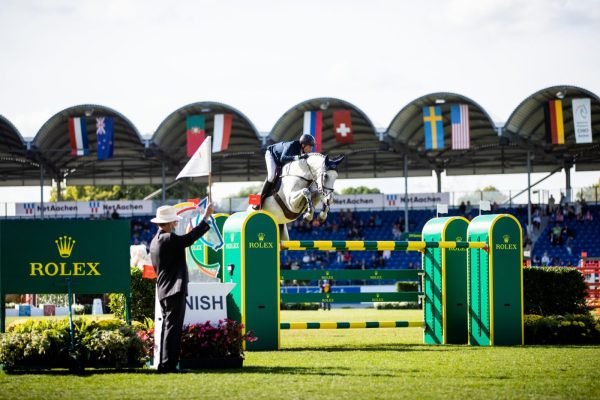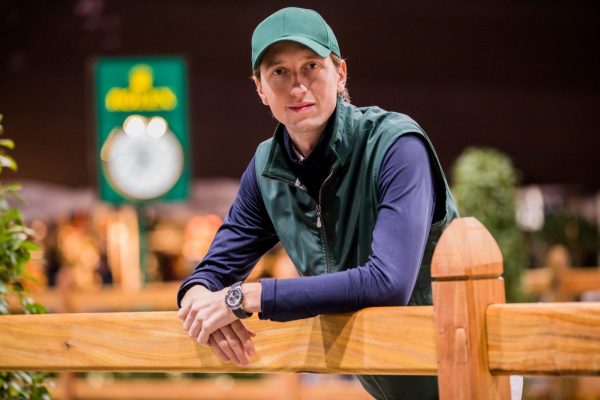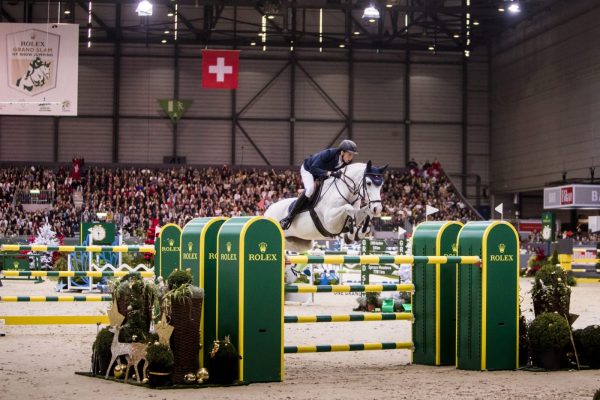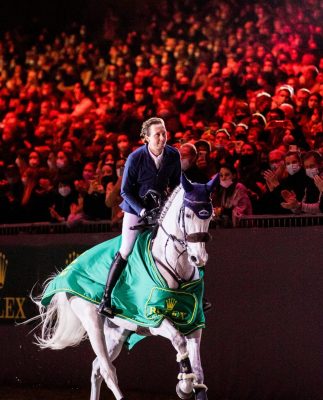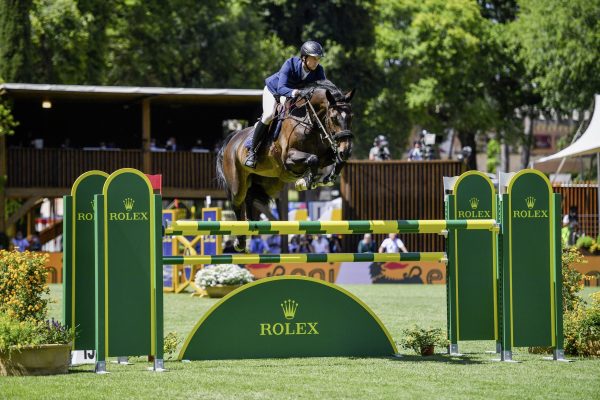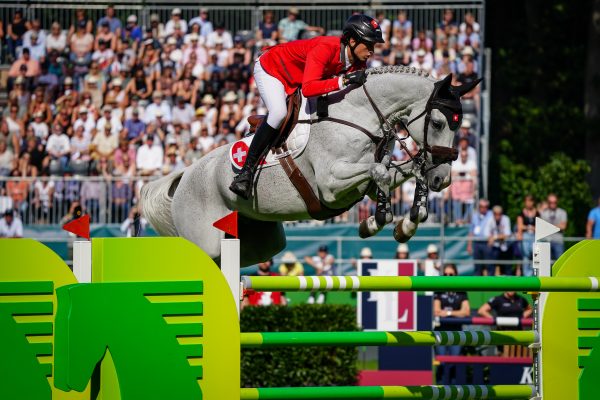For Swiss show jumping rider Martin Fuchs, the Palexpo in Geneva is a very special place. In a decorated career that has brought many accolades, the 30-year-old has enjoyed some of his finest moments at the indoor arena.
This year he returns to the venue chasing an unprecedented third consecutive victory in the Rolex Grand Prix, the culmination of five days of elite competition at the CHI Geneva from 7–11 December.
Rolex Testimonee Fuchs is without doubt one of the finest show jumpers today. A winner of some of the discipline’s most prestigious titles, he has twice reached No. 1 in the world rankings, but his triumph in last year’s Rolex Grand Prix in Geneva, following his victory in 2019, must rank as one of his most memorable achievements to date.
The odds were stacked against him. With 16 of the world’s top 20 riders competing, he entered the fray aboard Leone Jei, a grey gelding inexperienced at this highest level. Understandably, expectations were being managed. “Leone Jei was only nine years old at the time,” says Fuchs, currently ranked World No. 2, “and all the best horse and rider combinations are at Rolex Grand Slam events, so I did not go there expecting to win. Of course, I always try my best and hope to win.”
Fuchs, however, is an exceptional horseman, and Leone Jei a special horse, bursting with energy and enthusiasm, one who thrives under the bright lights of a five-star Grand Prix and is as comfortable in this heightened atmosphere as he is at home in the tranquility of Fuchs’ countryside yard outside Zurich. One of only six pairs to complete faultless rounds to qualify for the decisive jump-off, they sped around their final circuit. But world-class show jumping demands more than pace around the ring. It also requires power over the fences and close control with every stride, an elusive combination that can only come together when horse and rider have a strong connection and mutual trust. All those early morning training rounds, striking a balance between working with a horse and letting it rest, are small steps towards the biggest prizes, like the treasured silver salver of the Rolex Grand Prix.
In the jump-off to decide the winning combination, Fuchs and Leone Jei cleared every fence with a speed, comfort and grace that belied the 1.60-metre height of the jumps and their challenging placements. The pair’s time of 41.54 seconds could not be matched.
This was a particularly significant moment for both horse and rider. Fuchs became the first rider to successfully defend the Rolex Grand Prix title at the CHI Geneva, while Leone Jei graduated from future star status to outright superstar. “The victory was a bit surprising,” says Fuchs. “To beat all of those top combinations on such a young horse was phenomenal.”
The Rolex Grand Prix at Geneva is equestrianism’s fourth and final Major of the year, the others being The Dutch Masters, the CHIO Aachen in Germany, and the CSIO Spruce Meadows ‘Masters’ Tournament in Canada. Four of the sport’s most historic and prestigious shows, together they form the Rolex Grand Slam of Show Jumping. Considered the discipline’s greatest challenge and most coveted prize, it rewards any rider who wins three consecutive grand prix at these Majors. To date, the feat has been accomplished just once, by Scotland’s Scott Brash in 2015. The Rolex Grand Slam of Show Jumping illustrates the strength and depth of the brand’s support for top-class equestrian sport around the globe.
“The Rolex Grand Slam of Show Jumping was an incredible addition to our sport,” says Fuchs of the Grand Slam initiative, which was introduced in 2013. “We are so lucky to have Rolex as a supporter and sponsor at these shows. The support Rolex give its Testimonees is also incredible. This year I have planned my whole schedule around the Rolex shows because they are the best in the world. The shows have the best facilities, the best fences, the most history and tradition, as well as the great prize money. I do not know where we would be without Rolex’s support.”
Fellow Rolex Testimonee and former World No. 1 show jumper Kent Farrington concurs with Fuchs. The American, who claimed his first Major title when he won the Rolex Grand Prix at the CHI Geneva in 2017, says the Swiss watchmaker is an integral presence in equestrianism. “Rolex has brought everything to our sport; a level of prestige, huge prize money and with that comes the highest level of competitors, which boosts our audience, and Rolex continues to support the best venues in the sport, which keeps the highest level improving. All of this support attracts new, younger competitors and gives them something to aspire to. Everyone wants to jump at Rolex shows andeveryone wants to win Rolex Majors.”
Rolex’s association with equestrianism began in 1957 when show-jumping pioneer Pat Smythe became the brand’s first Testimonee from the sport. A year earlier, the irrepressible Englishwoman had become the first woman to compete in her sport at the Olympic Games, helping Great Britain to the bronze medal in the team event. She was the perfect fit for a company renowned for breaking boundaries in watchmaking, and for the constant pursuit of excellence and elegance.
Today, the Rolex family of equestrian Testimonees dominates the sport. In 2022, Fuchs has led the way, winning the 2022 FEI Jumping World CupTM Final in Leipzig in April and reclaiming the World No. 1 ranking two months later.
The Swiss equestrian’s rise to the elite ranks has come as no surprise to those who follow the sport. Fuchs was born into horse riding. His grandfather was a farmer whose vision to diversify and build a riding school laid the foundation for Fuchs’ father and uncle, Thomas and Markus, to grow up riding. The brothers both went on to represent Switzerland in show jumping at the Olympic Games, with his mother, Renata, also a Swiss national champion. They handed the baton to Martin, who started riding aged five and showed early potential as a horseman. In 2010, at the age of 18, he won team gold in the inaugural Summer Youth Olympics in Singapore, and his path to extending the Fuchs family legacy was set.
When Thomas Fuchs started coaching Swiss international rider Steve Guerdat, 10 years older than Martin, the young Fuchs had another ideal role model. Fuchs and Guerdat have since become close friends and rivals, as well as teammates on the Swiss national team. Helping each other and learning from each other, both men have reaped the dividends.
“Steve has always been my role model and this has never changed,” says Fuchs of his FEI European Championship teammate, with whom he claimed team gold in 2021. “To see how he trains and how he manages all of his horses is incredible. He has been in the top 10 for so many years, winning with so many different horses and this is so inspiring for me.”
Guerdat, who has been coached by Thomas Fuchs since 2007, says working with both men has been pivotal in his career. “Spending so much time with Thomas and Martin has created a very strong relationship between us, both professionally and as friends. Martin and I have a similar way of doing things, so we often don’t need to say a lot; it’s more the smaller details and knowing you have someone you can rely on. It is a very strong, real, true friendship.”
With the constant support of his father, and the positive influence of Guerdat, Fuchs enjoyed early success in his professional career riding the incomparable Clooney 51. The pair earned silver medals at the 2018 FEI World Equestrian GamesTM and at the 2019 FEI Jumping World CupTM Final, before taking individual gold at the 2019 FEI European ChampionshipsTM and winning his first Rolex Grand Prix at the CHI Geneva in 2019.
“The process of nurturing Clooney 51 was a lot faster than I have had with any other horse,” recalls Fuchs, who rode him to victory at the Swiss national championships when the horse was only eight years old. “For a horse that age, it was incredible. Unlike a lot of other horses, Clooney just got better as he got older. When other horses get older, they get tired and are not so fit, but with Clooney 51 it was the opposite. He was more relaxed, less stressed and became more confident in himself.”
The partnership between Fuchs and Clooney 51 delivered many triumphs, yet in the constant pursuit of excellence, a rider cannot rely on one horse alone; sustained success can only come with a team of horses. Now that Clooney 51 has retired, Fuchs and his team have carefully nurtured other exceptional horses into world-class jumpers, including Chaplin, The Sinner, Commissar Pezi, Conner Jei and Leone Jei.
“Chaplin is the horse of my heart,” says Fuchs of the horse he rode to victory in the 2022 FEI Jumping World CupTM Final. “He was never as naturally talented as Clooney 51 but he has the biggest heart and is such a fighter, which is why I love riding him so much. He gives you more than any other horse in the ring and as a rider that is so appreciated. It is very special to have a horse that tries so hard for you. We have become a really strong team and we are both fighting for the same thing.”
Success in show jumping at international level cannot be achieved without a strong team outside the arena. A team of four or five top-level competition horses requires daily work and attention. Riders also need to keep a stable of younger horses coming through, so a show jumping team requires a small army of support staff: stable hands, agile riders, people to manage the administration, train the horses, scouts to discover the young horses in the first place, and investors to help with the high running costs.
“I am very lucky that my family is very involved in the daily management of our horses,” says Fuchs, who continues to learn each and every day, and to strive for show jumping perfection, no matter how elusive that is. “My father is always the first one at the stables and he feeds them and puts them on the horse-walker. I usually start at 8am and my dad and I ride and jump the horses together. Often, he will lunge or warm up the horses for me. My mother is more involved with management, and she ensures that we have the correct paperwork for all the horses. We also have very good people around us who ride, groom and generally take care of my horses, which takes a lot of effort and time. Some of the horses sometimes get ridden twice a day, so it takes a lot of good people that you can trust with the horses. I am very lucky to have a very good team behind me so I can just focus on the jumping and the riding.”
This seamless teamwork behind the scenes that lays the foundation for Fuchs and his horses to perform at their best when it matters most, resonates with Rolex’s own pursuit of perfection. Each Rolex timepiece is ready to be enjoyed and treasured only after an outstanding level of input from a wide and varied cast of contributors. Every watch is designed, built and hand finished at the brand’s headquarters in Geneva. With the best people working together towards a common objective, with an unrelenting attention to detail and an unerring commitment to innovate, Rolex is able to craft the world’s most sought-after timepieces.


